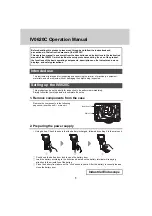
RT-Range User Manual
Revision: 190902
17
For single antenna systems, the heading is calculated from the inertial measurements. The
accuracies listed in Table 3 are achievable under dynamic conditions. Under static
conditions the heading accuracy of single antenna systems will degrade.
Non-ideal mounting of the GNSS antennas will reduce the heading accuracy, particularly
for dual antenna systems.
Environmental protection
The products are rated to IP65. To achieve IP65 it is necessary to have
connectors fitted to both TNC antenna connectors and to use self-amalgamating tape over
the TNC connectors.
Export control classification number
Export control regulations change, and so the classification number of the may
also change. The information presented here was correct when the manual was published.
products can fall under two different export control categories depending on the
type of accelerometer fitted internally. The type of accelerometer does not affect the
specification of the product, only the export control classification number (ECCN). Table
5 lists the ECCN for the products.
Table 5. ECCN for products
Product
ECCN
10G
7A103a1
30G
7A003d
Summary of Contents for Survey+ v3
Page 64: ...64 Oxford Technical Solutions ...
Page 100: ......
Page 101: ......
Page 102: ......
Page 103: ......
















































